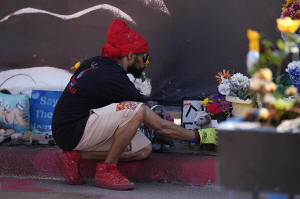Thousands mark 5th anniversary of George Floyd's murder as they call for
justice and decry Trump
[May 27, 2025]
By MARK VANCLEAVE and KENDRIA LAFLEUR
MINNEAPOLIS (AP) — Police reform and civil-rights activists joined
thousands of ordinary people Sunday to mark the fifth anniversary of
George Floyd’s murder and decry the Trump administration for actions
they say set their efforts back decades.
The Rev. Al Sharpton said at a graveside service with the dead man's
family in Houston that Floyd, 46, represented all of those “who are
defenseless against people who thought they could put their knee on our
neck.”
He compared Floyd's killing to that of Emmett Till, a 14-year-old Black
child who was abducted, mutilated and slain in Mississippi in 1955 after
being accused of offending a white woman.
“What Emmett Till was in his time, George Floyd has been for this time
in history,” Sharpton said.
Site of his death
Events in Minneapolis centered around George Floyd Square, the
intersection where police Officer Derek Chauvin used his knee to pin
Floyd’s neck to the pavement for 9 1/2 minutes, even as Floyd cried “I
can’t breathe.”
By midday Sunday, a steady stream of people were paying their respects
at a memorial in front of Cup Foods, where he was killed. Across the
street, activists had set up a feeding area at an old gas station that
has often served as a staging area since Floyd’s death. In the middle of
the street, a fake pig's head was mounted on a stick. The head wore a
police cap.
Events started Friday with music, a street festival and a “self-care
fair.” It culminated Sunday evening when hundreds gathered at the square
for a candlelit vigil that included a worship service, a gospel concert
and speeches calling for racial justice. A brass band then led the crowd
on a short march through city streets.

Even with Minneapolis officials’ promises to remake the police
department, some activists contend the progress has come at a glacial
pace.
“We understand that change takes time,” Michelle Gross, president of
Communities United Against Police Brutality, said in a statement last
week. “However, the progress being claimed by the city is not being felt
in the streets.”
Slow pace of change
Activists had hoped that the worldwide protests that followed Floyd's
murder on May 25, 2020, would lead to national police reform and focus
on racial justice.
Under President Joe Biden, the U.S. Justice Department had aggressively
pushed for oversight of local police it had accused of widespread
abuses. But the Trump administration moved Wednesday to cancel
settlements with Minneapolis and Louisville that called for an overhaul
of their police departments following Floyd’s murder and the killing of
Breonna Taylor.
[to top of second column]
|

A person visits the spot of George Floyd's murder at George Floyd
Square on the five-year anniversary of Floyd's death, Sunday, May
25, 2025, in Minneapolis. (AP Photo/Abbie Parr)

Trump also has declared an end to diversity, equity and inclusion
initiatives within the federal government, and his administration is
using federal funds as leverage to force local governments,
universities and public school districts to do the same. And
Republican-led states have accelerated their efforts to stamp out
DEI initiatives.
In Houston, Sharpton castigated the administration’s settlement
cancellations, saying they were “tantamount to the Department of
Justice and the president spitting on the grave of George Floyd.”
“To wait to the anniversary and announce this, knowing this family
was going to be brought back to the brokenheartedness of what
happened shows the disregard and insensitivity of this
administration,” he said. “But the reason that we will not be
deterred is that Trump was president when George Floyd happened and
he didn’t do anything then. We made things happen. And we’re going
to make them happen again.”
The future?
Detrius Smith of Dallas, who was visiting the Floyd memorial site
with her three daughters and five grandchildren, told one
granddaughter about how people globally united to decry racial
injustice after Floyd's murder.
“It just really feels good, just really to see everybody out here
celebrating the life, and the memories of George Floyd and just
really remembering what happened,” Smith said. “We want to do
everything we can to work together so everybody can have the same
equal rights and everybody can move forward and not have something
like that to continue to happen in this nation.”
Gail Ferguson of Minneapolis visited the site of Floyd's death on
Sunday, as she has done every year on the anniversary of his death.
Ferguson, who is a professor at the University of Minnesota's
Institute of Child Development leading an anti-racist parenting
intervention program for white parents of young white children, said
Floyd's murder brought attention to what she calls a racism
pandemic.
“It exposed white supremacy, and it exposed the fragility and the
passivity that can be part of the culture of whiteness,” she said.
___
LaFleur contributed from Houston.
All contents © copyright 2025 Associated Press. All rights reserved |